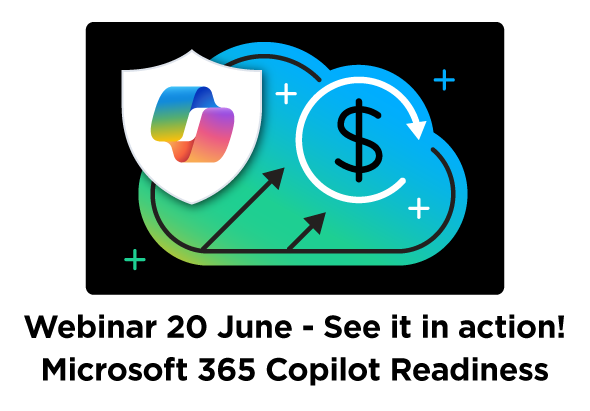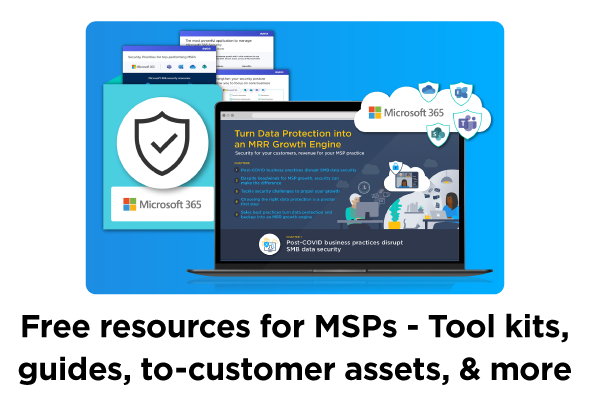This article is the second in a 3-part series:
Understanding Data Sprawl > Navigating Data Sprawl > Managing Data Sprawl
Today, data sprawl has emerged as a formidable challenge for businesses of all sizes. As data continues to grow across various platforms, devices, and applications, managing and securing it becomes increasingly complex. For Managed Service Providers (MSPs) and their customers, addressing this concern is not just a necessity but a strategic imperative.
As an MSP, you are pivotal in addressing data sprawl, but you can’t do it alone. Collaboration with your customers is important. This is where the concept of Shared Responsibility comes into play.
Shared responsibility with your customers is vital for success, and understanding your respective roles within the cloud environment is essential for safeguarding your customers’ Microsoft 365 data. Join us in this blog as we delve into the breakdown of these roles and how, together, they work to confront the pervasive issue of data sprawl.

The customer’s role
Below are three questions to consider when understanding your customers’ role and responsibility regarding their data:
1. Does my customer understand how their data is managed today?
Customers should know how their data is utilized and distributed across their business. A great place to start is by inventorying the applications, devices, and services employed across their teams. If this step is overlooked, it is usually a cue to consider data governance. Data governance involves establishing ownership, access, retention periods, and other data lifecycle procedures to comply with regulatory requirements and internal best practices. As their trusted advisor, you can assist in defining these protocols.
2. Are all of my customers’ employees aware of the need to be vigilant?
74% of breaches are related to human error, often stemming from a lack of awareness, and understanding. These challenges continue to increase due to the rise and sophistication of data threats like ransomware and phishing attacks. This means that ultimately, customers need to be aware of the impact of their decisions on how they are using, sharing, and storing sensitive data, and what to look out for.
Employee awareness and understanding are essential components of any data management strategy. By allocating time to learn about the latest threats, employees are better able to make informed decisions and mitigate common data risks.
3. Does my customer understand how future technology investments may create data risk?
It is crucial to assess how your customers are considering new technologies for their business. The existing technology stack is often overlooked, and they can fail to anticipate how future technology investments might introduce new data risks.
For instance, if a business solely relies on Microsoft 365 but then decides to integrate into a new platform, the customer may need to consider how safe their data is outside the Microsoft ecosystem. This introduces a new data risk that may not be adequately protected.
An additional consideration is the emergence and excitement around AI, specifically Microsoft Copilot. As interest continues to grow, it is important to bring it back to data fundamentals. As Chris Hales, Senior Cloud Consultant at Cubesys, highlighted, “AI provides great business potential, but customers can only tap into it effectively by revisiting basics like data governance, security, and protection to mitigate risks like data leaks.” Regardless of a business’s eagerness or caution in adopting new technology, proactive measures are essential when navigating unfamiliar terrain. After all, Hales concluded, “AI is great only if it has the right access to data and the right context to data.”
AI provides great business potential, but customers can only tap into it effectively by revisiting basics like data governance, security, and protection to mitigate risks like data leaks.”
The MSP’s role
Today businesses are overwhelmed with a surge of data from various sources, which leads to security risks and operational inefficiencies. As an MSP, your expertise in managing and securing data infrastructure is essential. By offering tailored solutions and support, you enable your customers to optimize data management, enhance protection, and leverage technology effectively. Here’s how you can provide value to your customers:
1. Use data to drive customer conversations on key concepts like retention
It is important to keep things simple to help your customers understand how their data is managed. Visualizations can greatly aid these conversations, and with SkyKick, Partners can employ Smart Insights to facilitate data-driven discussions regarding protected data. This provides a visual depiction of the data protected by the customer, enabling a deeper exploration into key concepts like retention. While retention policies are frequently overlooked by many customers, varied policies can hold significant importance, particularly in regulated markets. With SkyKick you can set retention policies by workload (i.e., a different policy between Microsoft Exchange and Teams) while ensuring compliance with industry-specific regulations.
2. Drive customer awareness through timely events like compliance and security updates
An effective method to raise customer awareness is by communicating compliance requirements at both a national and business level. Given the complexity of these topics, simplifying them is crucial for comprehension. By offering clear, straightforward training, customers can better understand their responsibility for business data, leading to increased awareness and commitment.
It is similarly important to educate your customers on the importance of compliance to combat data sprawl successfully. By guiding customers through complex regulatory requirements like GDPR and HIPAA, you can play a key role in ensuring compliance and mitigating legal risks. Additionally, adopting frameworks like the Essential 8 can further enhance security posture and resilience against evolving cyber threats.
3. Comprehensive data protection
Often most businesses’ primary use of technology is Microsoft 365, and this is where leveraging a comprehensive backup comes into play.
We use SkyKick Cloud Backup because it enables us to safeguard modern data workloads such as Planner and Teams. Moreover, when customers work in the cloud, the necessity for increased recovery points becomes evident. (Essential Eight)
Marc Hoeffle, Founder at IT Booster GmbH
Secondly, as it relates to AI adoption, corporate data is the fundamental building block for generative AI solutions, and data risk can prevent AI from producing the best possible responses. Therefore, safeguarding this intellectual property from risks is essential to maintaining a competitive advantage and underscores the critical importance of comprehensive coverage. This is why as Partners begin to navigate AI deployment and adoption, SkyKick Cloud Backup helps to provide comprehensive data protection across Microsoft 365.
Partnering for success
Shared Responsibility is key to guiding your customers in anticipating future risks. As you navigate this landscape, it is crucial to remember the fundamentals: data governance, security, and protection. Together, by embracing these principles and leveraging solutions like SkyKick Cloud Backup, you can confront Data Sprawl and safeguard business data effectively. To steer these discussions with your customers, we are offering you a free downloadable guide on the Essential Eight.


